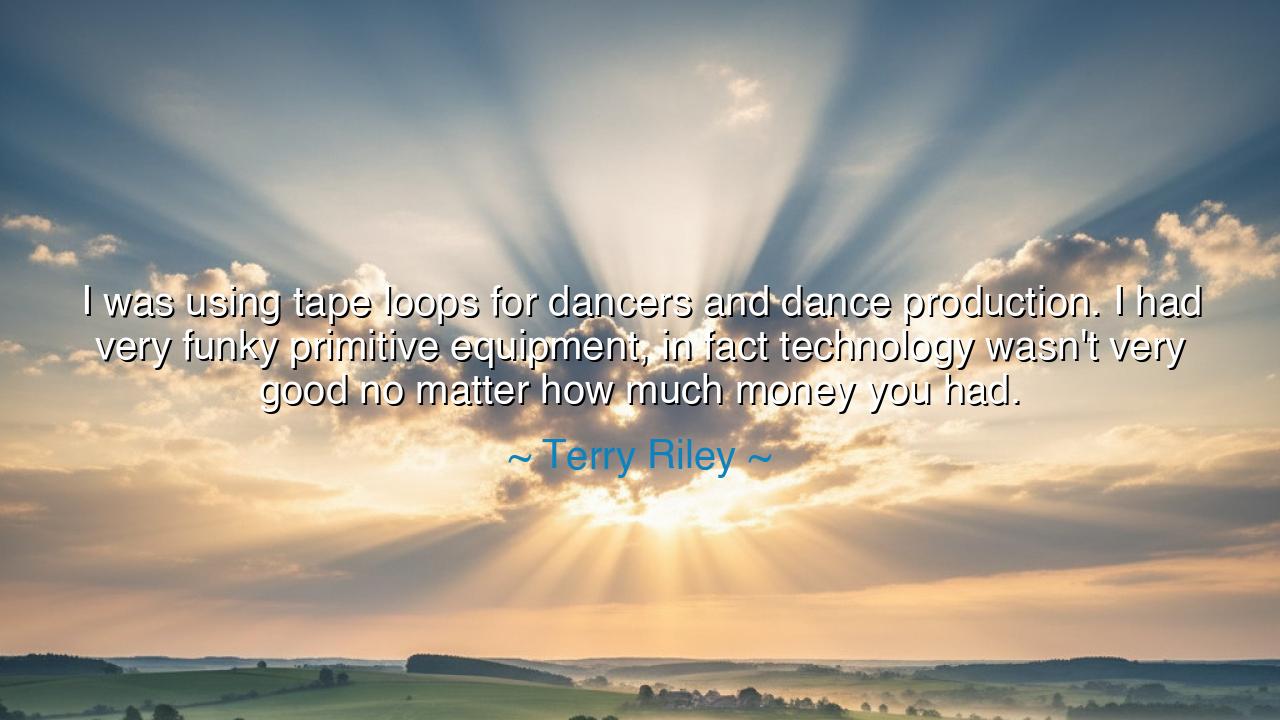
I was using tape loops for dancers and dance production. I had
I was using tape loops for dancers and dance production. I had very funky primitive equipment, in fact technology wasn't very good no matter how much money you had.






Hear the words of Terry Riley, pioneer of sound and prophet of minimalism: “I was using tape loops for dancers and dance production. I had very funky primitive equipment, in fact technology wasn’t very good no matter how much money you had.” In this saying lies the testimony of one who forged new worlds with crude tools, who revealed that artistry is not born of perfect instruments but of vision and courage. He reminds us that greatness comes not from the abundance of resources, but from the abundance of imagination.
The heart of Riley’s reflection lies in the struggle with primitive equipment. In his day, there were no sleek devices, no infinite libraries of sound, no digital conveniences. There were only reels of tape, scissors, loops, and machines that hissed and groaned. Yet from these humble tools he carved patterns of sound that mesmerized both dancers and audiences, weaving repetition and rhythm into something eternal. He testifies that even if wealth had been abundant, the technology of his time was still rough, and so the artist had to triumph not by tools but by will.
The ancients too knew this truth. Consider the early sculptors of Greece, who carved gods and heroes with chisels that were blunt and stone that resisted every stroke. Or the builders of the Pyramids, who raised monuments not with cranes or engines but with ropes, ramps, and sheer human endurance. The tools were primitive, yet the vision was mighty, and so their works endure even now. Riley’s words echo this lineage: the greatness of art does not depend upon the perfection of technology, but upon the determination of the artist.
History abounds with such examples. Think of Beethoven, writing symphonies while deaf, without the aid of modern recording or playback. He could not even hear the instruments as we do, yet his inner ear created harmonies that thunder across centuries. Or think of the Wright brothers, whose flying machine was little more than wood, cloth, and wire, yet carried humanity into the skies. Their equipment was crude, but their dreams were vast. So too did Riley, with reels of tape and patience, open a new chapter in the music of the modern age.
The lesson is clear: do not wait for perfect tools. The artist, the builder, the seeker, must begin with what is at hand. If your technology is primitive, let your imagination be advanced. If your equipment is faulty, let your spirit be resourceful. The true measure of creativity is not the power of the tool, but the power of the hand and mind that wields it. Riley’s testimony reminds us that progress often begins in struggle, and that limitation itself can become the spark of invention.
Practical counsel is this: do not despise humble beginnings. If you dream of music, start with the simplest instrument. If you dream of writing, begin with pen and paper. If you dream of invention, fashion your prototype with crude materials. The refinement of technology will come in time, but the essence of vision must be born in scarcity, where the soul learns to make much of little. Embrace constraint, for it is the forge of genius.
So let the words of Terry Riley resound not as lament, but as inspiration: “I had very funky primitive equipment… technology wasn’t very good.” And yet, from this imperfection arose sounds that shaped an era. The teaching is eternal: greatness is not hindered by poor tools, but by the failure to use them. Begin where you are, with what you have, and you too may shape beauty that endures beyond the limits of your age.






AAdministratorAdministrator
Welcome, honored guests. Please leave a comment, we will respond soon